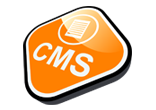Content Management Systems, oh my!
 Content management systems are being touted as the solution to all our problems, or at least all our website management problems. “So, what is a Content Management System, and what can it do for me?” you may be asking.
Content management systems are being touted as the solution to all our problems, or at least all our website management problems. “So, what is a Content Management System, and what can it do for me?” you may be asking.
Well, the answer is – it can do a lot! To sum it all up, a CMS will put the power to edit your website at your fingertips from any web browser, on any computer with an internet connection, and all with an easy-to-use interface.
Your typical website is coded in HTML, CSS, and PHP using fancy programs such as Adobe Dreamweaver, Flash, and others. The finished product is a grouping of web-ready files that are uploaded into a webserver using FTP (file transfer protocol), which then makes your website available to the general public. This type of website is difficult for an average person to modify, so if any edits need to be made to the site a web designer or developer needs to be hired to make the changes. And that’s where Content Management Systems come in handy.
A website powered by a content management system does not look any different to the visitor – it’s the inner workings that are different; a secret that can be kept between you, your developer, and your website host. The CMS can be accessed via Control Panel, accessible by you with a secret URL from any browser. After logging into the secure Control Panel, you have access to all the text, photos, videos, and other content that is on your website and you are free to edit as you please. Anything that is updated on the backend control panel is immediately updated on the frontend website.
The Pros
Here are some great reasons to become a proud new owner of a CMS website.
Make edits anytime, anywhere. All of the content on your website can be edited anytime, anywhere. Updates can be made more quickly, because you will not need to wait on your developer’s busy schedule.
Easy to use. Most content management systems are easy to use. They don’t require extensive technical knowledge to use them, so anyone can manage their own website with ease.
Reduce maintenance costs. By making website edits yourself, you cut down on the long-term development costs associated with hiring a developer to manage a standard website.
More cool features. Lots of neat features are readily available to a CMS such as blogs, user comments, social network sharing, galleries, and more. These are easily added via “plugins”, as opposed to a static site where these features would be more difficult (and more expensive) to create.
Internet Marketing. CMS websites inherently have more content on them and are updated more often, making them more desirable to search engines. This increases your possibility to rank higher in search results – although a more aggressive campaign should be followed if you are seriously interested in Search Engine Optimization (SEO).
Improved content archiving. Many CMS’es provide an archiving mechanism which allows you to save multiple older versions of webpages to refer to in the future or bring back onto the site. A static site would become a mess to manage if such versions were saved.
Syndicated, Incorporated. With a CMS, the content is separated from the design so that the content can be pulled and redistributed as you like. One common form of syndication these days is an RSS feed. This will keep people in touch with your site, and help encourage re-visitors.
The Cons
Well, truth be told, there’s not much bad to say about content management systems. They’re really that great. But here are a few things to consider.
Upfront Cost. A content management system is more pricey upfront, because the web developer must take more time in setting up a CMS than they would in a static website. However, the money spent is quickly recouped in savings on the maintenance end. There are also options to make your CMS less expensive up-front, such as opting for a website template instead of a custom design.
Learning Curve. Although easy to use, a CMS is still a new thing to get used to, and there can be a bit of a learning curve until you master the skill. Some technical support guidance from your developer and helpful video tutorials available online will help get you through this phase.
The right stuff. Not all content management systems are meant for all types of websites. You’ll want to choose a CMS depending on the features needed for your site, or you can find yourself with a system that doesn’t quite fit your needs. Your web developer will help in choosing the CMS that is right for you.
I hope this has been very informative as to what a content management system is, and what it can do for you. If you’re interested in having a Content Management System on your website, then the next step is deciding which one is right for you. To read more about the features available with some of the most popular CMS’es, check out this article.
By: JT Website Design specializes in content management system installation and configuration.
- If You Are Making Mistakes… - March 4, 2020
- What’s it gonna cost? - February 23, 2020
- Tis the Season for 1099’s. Should you file a 1099 for your vendors? - January 25, 2020
